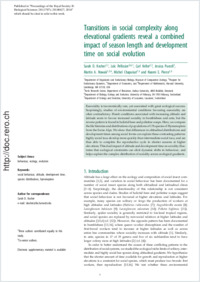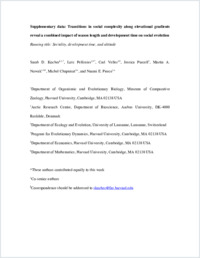Transitions in social complexity along elevational gradients reveal a combined impact of season length and development time on social evolution
Université de Fribourg
- Kocher, Sarah D. Department of Organismic and Evolutionary Biology, Museum of Comparative Zoology, Harvard University, Cambridge, USA
- Pellissier, Loïc Arctic Research Centre, Department of Bioscience, Aarhus University, Roskilde, Denmark - Department of Biology, Ecology and Evolution, University of Fribourg, Switzerland
- Veller, Carl Program for Evolutionary Dynamics, Harvard University, Cambridge, USA - Department of Economics, Harvard University, Cambridge, USA
- Purcell, Jessica Department of Ecology and Evolution, University of Lausanne, Switzerland
- Nowak, Martin A. Department of Organismic and Evolutionary Biology, Museum of Comparative Zoology, Harvard University, Cambridge, USA - Program for Evolutionary Dynamics, Harvard University, Cambridge, USA - Department of Mathematics, Harvard University, Cambridge, USA
- Chapuisat, Michel Department of Ecology and Evolution, University of Lausanne, Switzerland
- Pierce, Naomi E. Department of Organismic and Evolutionary Biology, Museum of Comparative Zoology, Harvard University, Cambridge, USA
-
22.07.2014
Published in:
- Proceedings of the Royal Society B: Biological Sciences. - 2014, vol. 281, no. 1787, p. 20140627
English
Eusociality is taxonomically rare, yet associated with great ecological success. Surprisingly, studies of environmental conditions favouring eusociality are often contradictory. Harsh conditions associated with increasing altitude and latitude seem to favour increased sociality in bumblebees and ants, but the reverse pattern is found in halictid bees and polistine wasps. Here, we compare the life histories and distributions of populations of 176 species of Hymenoptera from the Swiss Alps. We show that differences in altitudinal distributions and development times among social forms can explain these contrasting patterns: highly social taxa develop more quickly than intermediate social taxa, and are thus able to complete the reproductive cycle in shorter seasons at higher elevations. This dual impact of altitude and development time on sociality illustrates that ecological constraints can elicit dynamic shifts in behaviour, and helps explain the complex distribution of sociality across ecological gradients.
- Faculty
- Faculté des sciences et de médecine
- Department
- Département de Biologie
- Language
-
- English
- Classification
- Biological sciences
- License
-
License undefined
- Identifiers
-
- RERO DOC 211374
- DOI 10.1098/rspb.2014.0627
- Persistent URL
- https://folia.unifr.ch/global/documents/303874
Other files
Statistics
Document views: 158
File downloads:
- pdf: 184
- Supplementary material: 121

